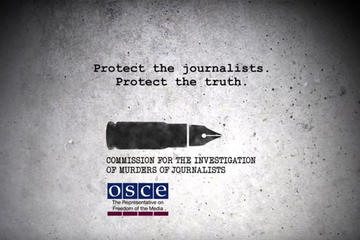
An OSCE conference on safety of the media in South-Eastern Europe adopted several recommendations, including the creation of a commission to investigate cases of murdered and missing journalists in Kosovo
Link: OSCE
An OSCE conference on safety of the media in South-Eastern Europe, concluded on February 14th, adopted several recommendations, including the creation of a commission to investigate cases of murdered and missing journalists in Kosovo, the provision of special protection to journalists and the adequate prosecution of perpetrators of threats and intimidation against female journalists.
The conference brought together over one hundred representatives of journalist associations, media and civil society from Belgrade, Podgorica, Prishtinë/Priština, Sarajevo, Skopje and Tirana, who discussed the progress made in investigating cases of murdered and missing journalists, regional models for dealing with this issue and threats faced by female journalists reporting online. They also examined on-going initiatives and efforts to ensure the safety of journalists.
“Journalists are key to transparency and accountability and the information they provide acts as a catalyst for a more accurate and relevant civic discourse,” the Head of the OSCE Mission in Kosovo, Jan Braathu, said. “If their ability to perform is curtailed, we risk upending the democratic foundations we have worked so hard to establish,” he added.
The full list of conclusions and recommendations will be presented by the OSCE Mission in Kosovo to relevant stakeholders, including at the high-level OSCE conference “Freedom of the Media in the Western Balkans”, to be held on the 27 February in Vienna.
During the event, an awareness raising campaign on safety of journalists was also launched. The campaign, supported by Austria and Kosovo Foundation for Open Society (KFOS), will be spearheaded by the video “Impunity Must End Now”, which will be aired by the Kosovo public broadcaster for the next two years
This publication has been produced within the project European Centre for Press and Media Freedom, co-funded by the European Commission. The contents of this publication are the sole responsibility of Osservatorio Balcani e Caucaso and its partners and can in no way be taken to reflect the views of the European Union. The project's page

 OSCE: Kosovo neads a commission on murdered and missing journalists
OSCE: Kosovo neads a commission on murdered and missing journalists




 All the contents on the Osservatorio Balcani e Caucaso website are distributed with a
All the contents on the Osservatorio Balcani e Caucaso website are distributed with a 